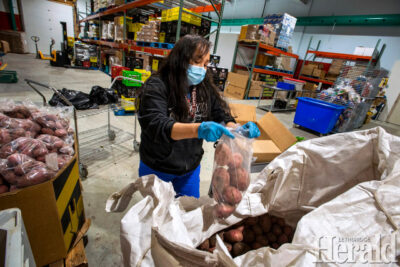Food bank usage expected to ‘skyrocket’ as income supports set to end
By Lethbridge Herald on November 4, 2021.
 Volunteer Zerlina Omeasoo portions out potatoes from a bulk bag while working this week at the Interfaith Food Bank. Herald photo by Ian Martens
Volunteer Zerlina Omeasoo portions out potatoes from a bulk bag while working this week at the Interfaith Food Bank. Herald photo by Ian MartensDale Woodard – Lethbridge Herald
Food bank use continues to rise for Lethbridge food banks.
That trend also points to a rocky time as the calendar gets ready to turn to 2022.
According to Food Banks Canada’s annual HungerCount report, released Thursday, more than 116,300 Albertans visited a food bank in March 2021.
That reflects a 30 per cent increase from previous years, a trend that illustrates the rising economic and social pressures across the country.
Food Banks Canada released the first HungerCount report since 2019, which offers a collection of data from food banks across the country that reflects the challenges, resilience and opportunities of the COVID-19 pandemic.
“Across the province things have been drastically changing over the last year,” said Danielle McIntyre, executive director for the Interfaith Food Bank. “The numbers have continued to climb since that point (March). We are bracing. We haven’t quite hit our pre-pandemic numbers yet, but I would expect by Christmas we will and come the New Year when all of these temporary supports are gone we’re expecting our numbers to skyrocket.”
HungerCount 2021 findings noted food bank visits topped 1.3 million in March 2021, the largest increase since the 2008 recession.
It also showed senior incomes and disability benefits have not kept up with inflation and seniors and people with disabilities are disproportionately represented in food banks across Alberta.
In a press release, the Interfaith Food Bank and the Lethbridge Food Bank Society said the trends have been noticed locally, with both major local food banks supporting more than 3,000 people monthly.
“Every year when we get into the colder months our numbers go up anyway,” said McIntyre. “But with recent announcements of the income support ending, we know there were a lot of people who qualified for CERB that maybe weren’t making that much money beforehand. Everybody has been kind of living in a bit of an imaginary state, having more money than they normally would have access to and with that being gone and taxable, 2022 is going to be one of those years where I think we are going to really rely on community support to ensure we’re able to support everybody who needs us.”
McIntyre said a five per cent increase in food costs is expected in addition to housing and fuel.
“Housing and fuel are something we haven’t managed to catch up with and we’re seeing a lot of our clients are using the money they have available for housing and fuel and the food budget is the only one that has some flux in it. Unfortunately, people won’t be eating as well as they don’t have other access.”
To tackle these issues, Food Banks Canada HungerCount is pushing recommendations to address the root causes of poverty and food security across five key areas.
“We don’t want to go back to normal. We want to go to a better system than we’ve had because the prior social safety net system was broken,” said McIntyre. “So we’re looking for new supports for people who are living in rental housing, especially for low income renters.”
Modernized and expanded supports for low wage and unemployed workers and progress toward a minimum income floor are also key points.
“If we have these social programs that say they’re supposed to provide for basic needs then they should be enough to provide for basic needs,” said McIntyre. “So having a minimum income floor that is realistic is something that’s very important.”
McIntyre said they’ve seen some progress with families with children, but it’s the demographic of single adults, adults who live alone, seniors and working individuals or people with disabilities that seem to get left behind.
“So there needs to be more support for low income single adults,” she said. “The other is always enhancing or improving access to affordable, good quality food in our northern and rural communities.”
McIntyre noted Thanksgiving to Christmas is when the majority of people think about the food bank but perhaps forget about it the rest of the year.
“I think as the weather is colder it’s just important that people think of one another and that while our struggle is still quite heavy, right now the average Joe is having a hard time,” he said. “If we can reflect on the fact there is always somebody in a worse circumstance and that it actually makes you feel good to help other people, reach out. If you see a neighbour in need, help them out or give to a charity or support program locally so you can have the most impact.”
For more information or to donate visit http://www.interfaithfoodbank.ca or http://www.lethbridgefoodbank.ca.
Follow @DWoodardHerald on Twitter
24-23




